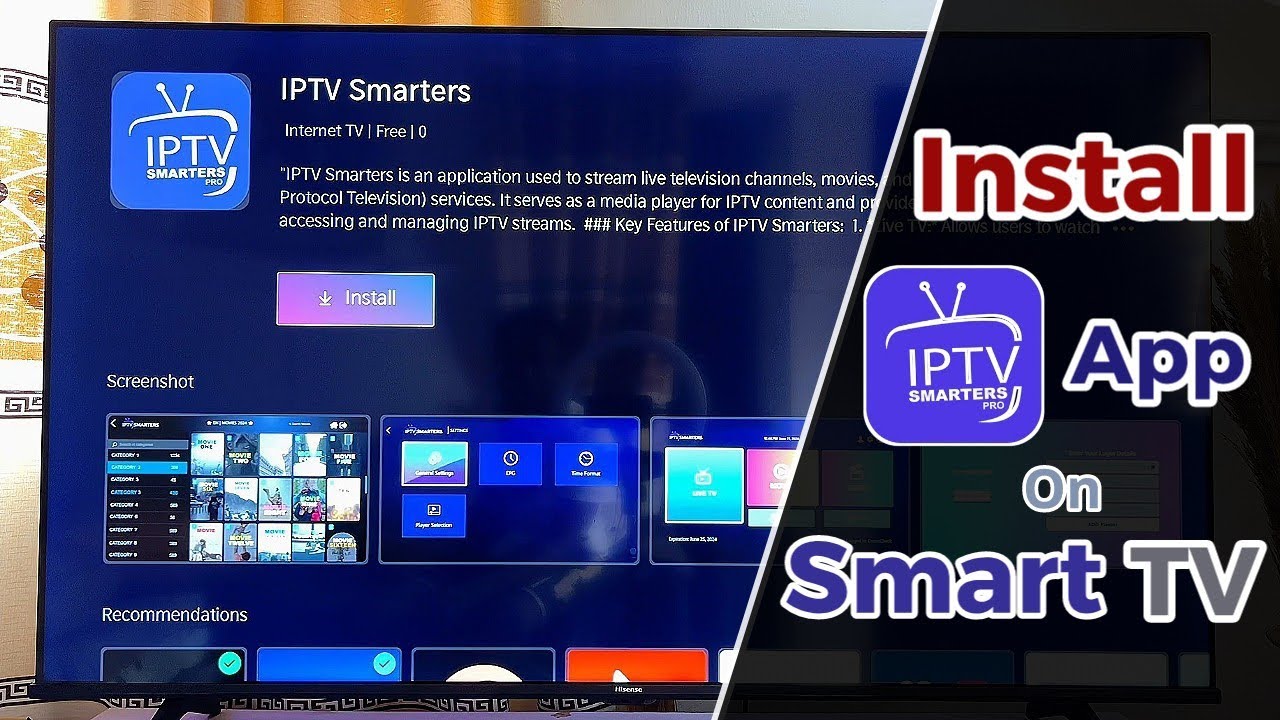Introduction to IPTV
Internet Protocol Television, commonly referred to as IPTV, is a multifaceted television delivery method that utilizes the Internet Protocol suite to transmit television programming. Unlike traditional cable and satellite television services, which rely on satellite signals or cable networks for content delivery, IPTV streams programming directly over the internet. This innovative approach allows users to watch their favorite shows and movies through a wide range of devices, including smart TVs, computers, and mobile devices.
The technology behind IPTV is straightforward yet sophisticated. It leverages broadband internet connections to facilitate a seamless streaming experience, enabling viewers access to live broadcasts and on-demand content. This contrasts with cable or satellite systems, where users often face limitations such as fixed programming schedules or lack of flexibility in content selection. IPTV often adopts a subscription-based model, allowing users to customize their viewing experiences by selecting packages that cater to their preferences and needs, thereby offering a more personalized service.
One significant advantage of IPTV is its capacity for interactivity. Viewers can pause, rewind, or reset broadcasts at any moment, which enhances the overall viewing experience. Additionally, IPTV typically provides wider channel selection and an extensive library of on-demand content, from the latest movies to classic series. As more households transition to smart TVs with advanced streaming capabilities, the appeal of IPTV becomes increasingly evident. It empowers consumers to take control of their viewing habits while enjoying quality content delivered through cutting-edge technology.
Wide Array of Channels and Content
One of the most compelling features of Internet Protocol Television (IPTV) is its vast array of channels and content offerings. Unlike traditional television services, which often limit viewers to a fixed selection of channels, IPTV provides access to a diverse range of local, national, and international programming. This flexibility enables users to tailor their viewing experience to align with their specific preferences and interests.
IPTV services typically include a comprehensive mix of channels that feature everything from mainstream news networks, popular entertainment channels, and sports programming to niche options catering to specific tastes. For instance, users can enjoy everything from local news stations to globally recognized networks, ensuring they remain connected to both their community and the world at large. In addition to these options, IPTV delivers access to premium channels, often without the need for costly cable packages.
Moreover, IPTV excels in offering a variety of live programming that may not be easily accessible through traditional broadcasting methods. This includes live sports events, news coverage, and even international programming that can broaden viewers’ horizons. For example, users can seamlessly switch between watching a local football game and a foreign cultural documentary—all from the convenience of their smart TV.
This wide array of channels enhances the viewer’s content experience, as it not only incorporates mainstream entertainment but also promotes lesser-known channels that cater to niche audiences. Such opportunities allow for the exploration of different cultures and genres, making IPTV a suitable choice for viewers seeking more extensive and customized programming options. In conclusion, the extensive channel offerings available through IPTV contribute significantly to its appeal, making it an increasingly popular choice for home entertainment.
Cost-Effectiveness and Flexibility
In recent years, Internet Protocol Television (IPTV) has emerged as a compelling alternative to traditional cable subscriptions, particularly when it comes to cost-effectiveness and flexibility. One of the most significant advantages of IPTV is the potential for substantial savings. Traditional cable services often come with high monthly fees, coupled with hidden charges that can inflate the overall cost. In contrast, many IPTV providers offer competitive pricing models that cater to a variety of budgets. This cost efficiency allows consumers to enjoy a vast array of channels without the exorbitant costs typically associated with cable.
Moreover, IPTV services frequently operate on a subscription basis that provides users the flexibility to choose from various packages tailored to their preferences. For instance, many providers offer basic packages for those who prefer occasional viewing and premium packages for users who demand comprehensive access to an extensive library of channels and on-demand content. This level of customization is notably absent in many traditional cable packages, which often enforce a one-size-fits-all approach.
Another important consideration is the ability to cancel or modify IPTV subscriptions with relative ease. Unlike traditional cable contracts that may lock consumers into long-term agreements or incur cancellation fees, IPTV services generally allow users to adjust their subscriptions at any time, making it an ideal choice for those who seek both flexibility and cost savings. Additionally, some IPTV providers offer pay-as-you-go options, further enhancing their appeal to users who may only want certain content for a limited time.
In conclusion, the cost advantages and flexibility of IPTV make it an attractive choice for viewers seeking to maximize their entertainment options while managing their budgets effectively. With customizable packages and easy subscription management, IPTV stands out as a modern solution to traditional cable’s limitations.
Enhanced Viewing Experience with Smart TVs
Smart TVs have revolutionized the way we consume entertainment, especially through IPTV services. By combining advanced streaming capabilities with a plethora of integrated applications, these devices provide users with a viewing experience that is both versatile and dynamic. The high-definition support offered by many smart TVs allows for crystal-clear picture quality, making IPTV even more enjoyable. As a result, viewers can indulge in their favorite shows, movies, and sports events with stunning visual clarity.
Moreover, the user interface of smart TVs greatly enhances the IPTV experience. Most models come equipped with intuitive navigation systems that simplify access to various channels and services. Instead of scrolling through lengthy channel lists, users can benefit from personalized recommendations, search functionalities, and easy-to-use menu layouts, all designed to streamline the entertainment selection process. This user-centric approach not only saves time but also enhances the overall enjoyment of consuming digital content.
In terms of compatibility, smart TVs are designed to support a wide range of IPTV services. Whether it’s industry-leading platforms or niche providers, users have plenty of options at their fingertips. This diversity allows consumers to explore various content libraries, catering to different tastes and preferences. Many smart TVs also include features such as screen mirroring and casting, enabling viewers to send content from their mobile devices directly to the larger TV display. Such integration further illustrates the adaptability of smart TVs in enhancing the IPTV experience.
In conclusion, the combination of superior streaming capabilities, integrated applications, and user-friendly interfaces makes smart TVs an excellent choice for anyone looking to elevate their IPTV experience. The compatibility with numerous IPTV services enhances the viewing pleasure, allowing for endless entertainment possibilities directly from the comfort of your living room.
Access to Global Content
One of the most compelling advantages of Internet Protocol Television (IPTV) is its ability to deliver a wealth of international content directly to your smart TV. Unlike traditional television services, which often limit viewers to regional programming, IPTV offers a vast array of channels encompassing diverse cultures, languages, and genres. This access to global content can enrich the viewing experience, allowing audiences to explore shows, movies, and sports events from around the world.
For expatriates or individuals living away from their home country, IPTV becomes an invaluable resource. It enables them to reconnect with their home culture by accessing familiar television programs or local news. This feature not only serves as a bridge to their roots but also aids in alleviating feelings of isolation that can accompany relocation. Enhanced by the on-demand nature of IPTV, viewers are no longer confined to specific airtimes, allowing them to enjoy international content at their convenience.
Moreover, the diverse library available through IPTV platforms often includes films and series that may not be readily accessible via traditional media outlets. Such offerings can introduce viewers to unique storytelling styles and cultural perspectives, fostering a broader understanding of global narratives. The sector also caters to multi-language options, making it easier for viewers to engage with content in their preferred language or to even learn new languages through entertainment.
In essence, IPTV’s diverse programming and global reach provide unparalleled opportunities for viewers to experience the world from the comfort of their homes. Whether one’s interests lie in international sports, popular dramas, or educational documentaries, IPTV stands out as a versatile choice for those eager to explore everything global television has to offer.
Personalization and On-Demand Features
One of the key advantages of IPTV services is their ability to provide personalized viewing experiences tailored to individual preferences. Unlike traditional cable television, which offers a fixed array of channels, IPTV platforms allow viewers to curate their content, thereby enhancing the overall entertainment value. Through on-demand content, users have the flexibility to watch their favorite shows and movies at their convenience, without the constraints of a predetermined broadcast schedule.
Moreover, many IPTV services incorporate features such as paused live TV, which lets viewers interrupt live programming and resume viewing later. This capability is particularly beneficial for those with busy schedules or for families where members may want to watch content at different times. It addresses the need for flexibility in today’s fast-paced environment, allowing users to manage their viewing habits according to personal availability.
Customizable playlists further enhance user experience by enabling subscribers to create a personal collection of favorite programs and films. This not only streamlines the viewing process but also fosters a sense of ownership over content consumption. The ease of navigation through curated lists can significantly elevate viewer satisfaction by reducing the time spent searching for desired entertainment.
User profiles also play a vital role in personalization. Many IPTV platforms allow multiple profiles, making it possible for different family members to maintain their individual preferences and viewing histories. Recommendation systems analyze user behavior to suggest content that aligns with viewers’ tastes, actively promoting engagement and exploration of new titles.
Ultimately, these personalization options—ranging from on-demand content and paused live TV to customizable playlists and user profiles—demonstrate the evolution of television consumption. IPTV services truly embody a shift towards a more user-driven, enjoyable viewing experience.
User-Friendly Interfaces and Navigation
Today’s IPTV platforms have significantly transformed television viewing experiences through their user-friendly interfaces and intuitive navigation systems. These advancements not only enhance the overall user experience but also serve as a crucial factor in retaining customers. An essential feature of IPTV services is the ease with which users can navigate between channels and services. Most platforms are designed to provide quick access to a vast array of channels, allowing users to switch seamlessly between their favorites with minimal effort.
The search functionality offered by many IPTV services is another highlight. Users can easily look up their preferred shows, movies, or channels using simple keyword searches. This search capability often comes with filtering options based on genres, air dates, or popularity, which makes locating content much more efficient. Additionally, many IPTV interfaces are equipped with personalized recommendations, showcasing programs based on the user’s viewing habits, further simplifying the content discovery process.
Moreover, the layout of these interfaces is typically structured with a focus on user experience. Centralizing popular features, such as live TV listings, on-demand catalogs, and recently viewed items, helps to create an engaging environment that is easy to navigate. This thoughtful organization is pivotal, as a smooth interface allows users to maximize their time spent entertaining themselves, rather than grappling with clunky menus or complicated navigation trails.
Ultimately, the robust and easy-to-use design of IPTV platforms plays a vital role in customer satisfaction. By facilitating straightforward navigation and quick access to myriad entertainment options, IPTV ensures an enjoyable viewing experience that meets the modern user’s expectations. The emphasis on user-friendly interfaces is a compelling reason to consider incorporating IPTV into your smart TV setup.
Legal Considerations and Choosing a Service
As the demand for IPTV services continues to grow, understanding the legal implications surrounding these offerings becomes crucial for consumers. Internet Protocol Television (IPTV) provides access to television programming via the internet, but not all services operate within the bounds of copyright law. Therefore, it is essential to differentiate between legitimate IPTV providers and illegal streaming options, which may put users at risk of legal repercussions and exposure to unregulated content.
Legitimate IPTV services typically hold necessary licenses to distribute content, ensuring that they comply with copyright regulations. These providers often include well-known brands or partnerships with established networks, giving consumers peace of mind regarding content legality. On the other hand, illegal IPTV services often promise extensive channel lineups at significantly low prices, which may seem appealing. However, these services often infringe on copyright laws and could expose users to legal issues and malware risks.
When selecting a reputable IPTV service, consumers should consider several key factors. First, research the provider’s licensing agreements and affiliations. A trustworthy IPTV service will be transparent about its partnerships and will often showcase its content rights. Secondly, read customer reviews and ratings online, focusing on experiences related to service reliability and legal compliance. Another essential tip is to evaluate the quality of customer support, which can be indicative of the provider’s commitment to compliance and service satisfaction.
In summary, it is vital to navigate the IPTV landscape with a careful approach to legal considerations. By choosing a legitimate service that adheres to copyright laws, consumers can enjoy the benefits of IPTV technology while minimizing potential legal risks associated with unlicensed streaming content.
Conclusion: Making the Switch to IPTV
As the television landscape evolves, the transition to Internet Protocol Television (IPTV) presents numerous advantages for smart TV users. This technology allows viewers to access a plethora of channels and on-demand content via the internet, ultimately transforming the way we engage with media. One of the primary benefits of IPTV is its flexibility. Unlike traditional cable services, IPTV provides the convenience of watching shows and movies at one’s own pace, with the capability to pause, rewind, or fast forward through content as desired.
Moreover, the cost-effectiveness of IPTV services often surpasses that of conventional cable subscriptions. Most IPTV providers offer various packages that can be tailored to suit diverse viewing preferences and budgets. This means users can enjoy a rich selection of content while potentially saving money on their monthly bills. The increased accessibility of international channels further enhances the value of IPTV, allowing users to explore global content that may not be available through traditional means.
For tech-savvy consumers, integrating IPTV with smart TVs is a seamless process. Many modern smart TVs come equipped with built-in applications that allow users to access IPTV services directly. This user-friendly characteristic encourages viewers to maximize their devices’ potential and engage with the diverse offerings available through IPTV platforms. In this digital age, where immediate gratification is the norm, IPTV caters to the demand for varied and convenient viewing experiences through its robust libraries of programming.
In conclusion, embracing IPTV is not only a step towards modernizing your entertainment options but also an opportunity to enhance your overall viewing experience. With its flexibility, cost-efficiency, and broad access to content, switching to IPTV can significantly enrich the way you enjoy television. As consumers become increasingly reliant on technology for their entertainment needs, the case for transitioning to IPTV becomes clearer, paving the way for a more engaged and fulfilling viewing journey.
-
How to Watch Asian TV in Europe Using IPTV Foxworld
Introduction to IPTV and Foxworld Internet Protocol Television (IPTV) represents a significant advancement in television broadcasting technology, allowing users to receive programming through internet connectivity instead of traditional satellite or cable methods. Unlike conventional television services, which deliver content via radio waves or physical cables, IPTV transmits multimedia content via Internet Protocol, enabling viewers to…
-
How to Stream Arabic TV in Europe with IPTV Foxworld
Introduction to IPTV and Its Benefits IPTV, or Internet Protocol Television, represents a significant shift in the way television content is delivered to viewers. Unlike traditional cable or satellite TV, which rely on high-maintenance physical infrastructure, IPTV utilizes the internet to transmit video content. This technological advancement allows viewers to access a plethora of channels…
-
The Ultimate Comparison: The Best Apps for Watching IPTV
Introduction to IPTV Internet Protocol Television, commonly referred to as IPTV, represents a modern method of delivering television content. Unlike traditional television broadcasting methods, like satellite or cable, IPTV utilizes internet protocols to stream content directly to devices. This transition to an internet-based format allows users to access a vast array of programming through their…





